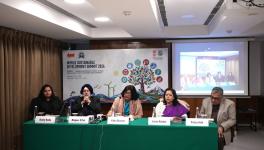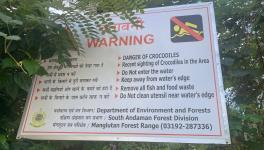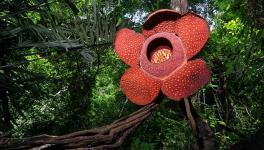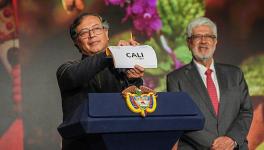Indonesia: How Sustained Resistance is Saving a Critical Rainforest From Corporate Greed
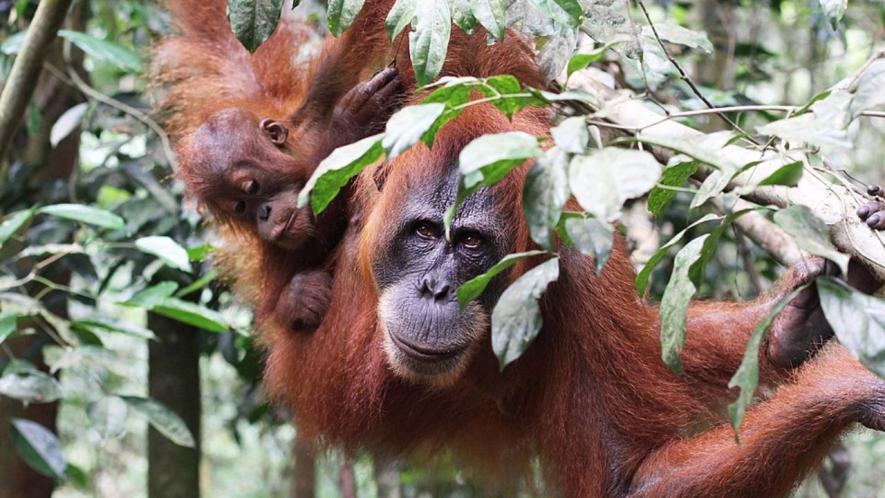
Introduction
In Indonesia’s Leuser Ecosystem, orangutans swing through the treetops, rhinos roam free, and elephants share the land with tigers. It is the last place on Earth where they still coexist in the wild—and it’s under siege. The battle to save it reveals the deep connections between consumer products, Indigenous rights, and the fight for climate justice.
In the far northwest corner of Indonesia’s Sumatra island lies a place so biologically rich and ecologically vital that scientists consider it one of the most critical rainforests left on Earth. The Leuser Ecosystem encompasses over 6.5 million acres of dense forest, peat swamp, and rugged mountains. It is a haven for life—and, until recently, a blind spot in the global imagination.
Leuser is more than a biodiversity hotspot. It is the last natural sanctuary on Earth where Sumatran orangutans, elephants, tigers, and rhinos coexist. Beyond these charismatic megafauna, the forest is home to thousands of unique plant and animal species. The deep peat soil stores vast amounts of carbon, making it a natural buffer against the climate crisis. And its rivers and rainfall sustain millions of people in the Aceh and North Sumatra provinces who depend on the forest for clean water, medicine, food, and cultural heritage.
For the Indigenous Gayo, Alas, Kluet, Aneuk Jamee, and Karo peoples, Leuser is not merely a forest—it is sacred ancestral land. Their stewardship has kept the ecosystem intact for centuries. But in recent decades, an insatiable global hunger for one cheap commodity has pushed Leuser to the brink: palm oil.
Conflict Palm Oil: The High Cost of Cheap Convenience
From cookies and instant noodles to shampoo and lipstick, palm oil is everywhere. Found in nearly half of all packaged products on supermarket shelves, it’s the most widely consumed vegetable oil in the world. It’s also one of the most destructive.
Indonesia and Malaysia produce more than 85 percent of the world’s palm oil. To meet rising demand, corporations have cleared vast tracts of rainforest, often illegally, to plant monocultures of oil palm. The result has been catastrophic deforestation, widespread human rights violations, and the draining of carbon-rich peatlands that accelerate global warming.
Nowhere has this destruction been more visceral than in the Leuser Ecosystem. Fires were raging in the Tripa peat swamp—a part of the Leuser Ecosystem—set intentionally to clear land for plantations. Endangered orangutans were dying in the flames. Smoke blanketed nearby villages. The world wasn’t watching—yet.
In 2012, an emergency call from Indonesian allies reached the offices of my organization, Rainforest Action Network (RAN) in San Francisco. We responded by launching what would become a decade-long campaign of investigations, corporate pressure, grassroots action, and international media advocacy aimed at defending this last wild stronghold from the bulldozers of industrial agriculture.
Exposing the Supply Chain: From Rainforest to Retail
Our approach was bold and methodical. We traced the origins of palm oil from the scorched frontlines of the Leuser ecosystem to the boardrooms of major consumer goods companies, including Nestlé, PepsiCo, Unilever, Mars, Mondelēz, and others. Using satellite imagery, drone surveillance, field investigations, and shipping records, RAN’s teams followed the trail of destruction from plantations grown on deforested lands to mills, traders, refiners, and—finally—into the snacks, soaps, and cereals we buy every day.
The revelations were damning. Multinational corporations were repeatedly caught sourcing Conflict Palm Oil—oil linked to deforestation, illegal land clearing, and the violation of the rights of local communities. We launched Leuser Watch, a watchdog platform that names and publishes detailed investigations connecting palm oil grown in deforested areas of Leuser directly to global brands.
These investigations weren’t confined to dusty PDFs. We collaborated with filmmakers, artists, and high-profile environmental advocates. Leonardo DiCaprio’s climate documentary, Before the Flood, prominently features the Leuser Ecosystem and the palm oil threat, bringing global attention to the issue. Suddenly, what was once obscure was now on the radar of millions.
People Power: Shaming the Snack Food Giants
With the facts laid bare, we mobilized public outrage into pressure. The “Snack Food 20” campaign targeted the biggest corporate buyers of palm oil, demanding they adopt and enforce real standards: No Deforestation, No Peatlands, No Exploitation (NDPE).
Through petitions, creative protests, and shareholder activism, supporters around the world have called out companies such as PepsiCo, Nestlé, Mondelēz, and General Mills. Actions ranged from disrupting corporate meetings to massive banner drops, like the 100-foot-long message unfurled from PepsiCo’s billboard on the Manhattan waterfront. Grassroots groups placed warning stickers on offending products in grocery stores. Social media was flooded with messages demanding reform.
Inside boardrooms, the heat worked. Over 200 companies, brands, traders, and banks eventually committed to NDPE policies. These weren’t empty gestures: they included hard requirements to map supply chains, verify sourcing, and end business relationships with bad actors. Some companies began funding forest restoration and monitoring programs. A few even took direct responsibility for their sourcing impacts in the Leuser Ecosystem.
But progress was uneven. While companies like Unilever, Nestlé, Mars, and Ferrero took significant steps, claiming to be achieving more than 90 percent traceability to plantations in the Leuser Ecosystem, others lagged behind. Many NDPE policies remain poorly enforced, with loopholes and vague language that allow deforestation to persist behind a veil of “sustainability” branding.
From Exposure to Restoration: A Landscape-Level Revolution
Recognizing that real change wouldn’t come from isolated pledges, RAN pivoted toward an ambitious new strategy: landscape-level conservation. The idea was to go beyond advocacy for individual companies to encourage collaboration on creating jurisdiction-wide initiatives that involved governments, smallholder farmers, regional civil society organizations, and local communities working together to protect forests, achieve responsible palm oil production, and improve livelihoods.
The sub-district of Aceh Tamiang became the first test case. There, the head of the district government worked with a coalition of actors to launch a deforestation-free palm oil verified sourcing area in 2019. By 2021, deforestation had plummeted. Over 5,100 hectares of degraded land were restored, and an innovative radar-based monitoring system enabled real-time responses to illegal clearing. Local patrols and community programs, run by civil society organizations and supported by government agencies and companies such as PepsiCo and Unilever, played a key role.
The model worked—and it spread. Landscape programs have since been launched in Aceh Timur, Aceh Singkil, and at the provincial level. These initiatives aim to protect critical lowland forests, establish “No-Go Zones” for palm oil expansion into forest frontiers, and support Indigenous land rights and the resolution of conflicts between communities and palm oil companies. Brands began funding alternative livelihoods and land titling for smallholder farmers. Local civil society organizations took the lead in restoration.
Musim Mas, a prominent Indonesian trader previously exposed by RAN, has shifted its focus from deforestation to leadership, working with its clients to provide over $2 million for conservation projects in Aceh.
These aren’t just charity projects. These efforts aim to rebuild trust, repair damage, and demonstrate that commodity production doesn’t have to result in destruction.
Holding the Line: The Work Still Ahead
Despite the victories, the threats to Leuser haven’t disappeared. Rogue producers still operate. Banks continue to finance palm oil giants without full accountability. Many brands still cannot trace all their supply. Grievance trackers exist, but enforcement is inconsistent. The risk of backsliding is high.
Worse still, as new global regulations, such as the EU Deforestation Regulation (EUDR), come into effect, some corporations may shift their dirty palm oil to less regulated markets. Without sustained pressure, the progress made could be undone.
That’s why we are expanding our efforts. In 2025, we surveyed major brands and traders on their implementation of No Deforestation, No Peat, No Exploitation (NDPE) in the Leuser Ecosystem. The findings were mixed, but offered hope. Companies with deep traceability and transparent monitoring showed measurable results. Those investing in collaborative forest monitoring and conflict resolution were beginning to collaborate meaningfully with civil society groups.
But a key lesson remains: transformation requires transparency. Without visibility into sourcing practices, without robust grievance systems, and without public accountability, corporate promises hold little value.
A Global Model for Environmental Justice
The Leuser campaign is not just a story about forests. It’s a story about power—how it’s wielded, challenged, and ultimately rebalanced. It’s about how grassroots movements, Indigenous communities, and international solidarity can take on global corporations and win real, measurable change.
It’s also a cautionary tale. Had no one answered that urgent call in 2012, the most threatened lowland rainforests of the Leuser Ecosystem might already be gone. It underscores the urgency of responding quickly to emerging threats—and the necessity of a long-term commitment to protect what remains.
Now, with global forest frontlines under pressure—from the Amazon to the Congo to Borneo—the Leuser campaign offers a replicable model. It demonstrates that when policy, pressure, and partnership converge, even the most complex problems can be effectively addressed.
The Next Chapter Starts Now
After more than a decade of fierce activism, relentless investigation, and unlikely collaboration, the Leuser Ecosystem is still standing. It’s not pristine. It’s not out of danger. But it’s stronger than it was. And that’s because people around the world chose to act.
This work is far from finished. Activists are carrying Leuser’s lessons into new landscapes, challenging the expansion of industrial agriculture, and advocating for corporate accountability rooted in human rights and environmental justice. And they’re asking the rest of us—consumers, voters, donors, and dreamers—to stay engaged. Because what happens next in the Leuser Ecosystem may determine the future of tropical forests everywhere.
Laurel Sutherlin is the senior communications strategist for Rainforest Action Network. He is a lifelong environmental and human rights campaigner as well as a naturalist and outdoor educator. Follow him on Twitter @laurelsutherlin.
Courtesy: Independent Media Institute
Get the latest reports & analysis with people's perspective on Protests, movements & deep analytical videos, discussions of the current affairs in your Telegram app. Subscribe to NewsClick's Telegram channel & get Real-Time updates on stories, as they get published on our website.









